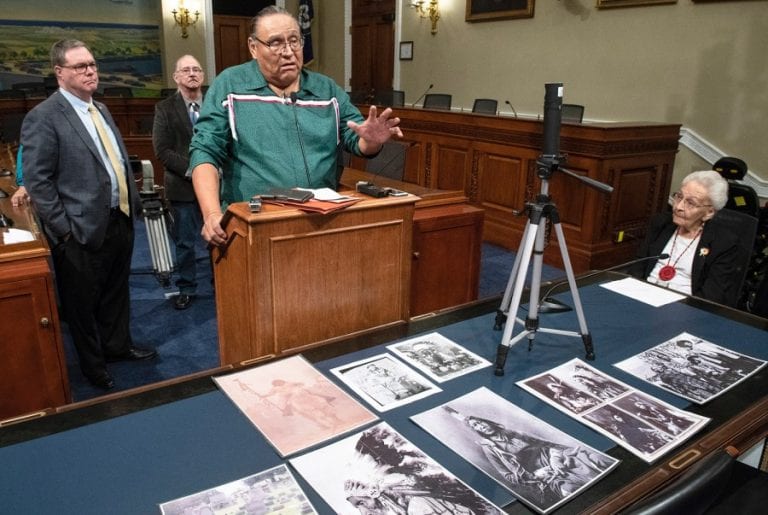
- Details
- By Levi Rickert
Opinion: When U.S. Secretary of Defense Pete Hegseth announced Sept. 25 that he would not rescind the Medals of Honor awarded to approximately 20 members of the U.S. 7th Cavalry for their actions at the 1890 Wounded Knee massacre, he wasn’t preserving history. He was protecting a lie.
That lie — that what happened at Wounded Knee was a battle deserving of the nation’s highest military recognition — has been told for over 130 years. But Native Americans know the truth. It wasn’t a battle. It was a massacre. And it remains one of the most painful, unresolved wounds in American history.
The soldiers of the 7th Cavalry were not heroes that day. They killed as many as 300 Lakota people — most of them unarmed women, children and elders. They shot into tipis, chased survivors into ravines and left bodies frozen in the snow. For this, the Medals of Honor were awarded. That is not courage. That is horror.
This Is Not About “Wokeness.” It’s About Truth.
In defending his decision, Hegseth has framed the debate around what he calls “woke” politics and vowed to put an end to what he called “historical revisionism.” But this is not revisionism. This is accountability.
In 1990, on the 100th anniversary of the massacre, Congress passed a resolution expressing “deep regret” to the descendants of those killed at Wounded Knee. Tribal leaders, historians and descendants of survivors have spent decades calling for the revocation of the medals — not as an erasure of history, but as a correction of it.
Instead of listening, Hegseth closed the door. “This debate is over,” he said. One problem: Native people were never invited to the debate to begin with.
The National Congress of American Indians released a statement following Hegseth’s announcement that said “such despicable violence should not have been lauded in the first place.”
“Honoring those involved in the Wounded Knee Massacre with the United States’ highest military award is incompatible with the values the Medal of Honor is meant to represent,” NCAI Executive Director Larry Wright Jr. said. “Celebrating war crimes is not patriotic. This decision undermines truth-telling, reconciliation, and the healing that Indian Country and the United States still need.”
Honor Should Not Be Awarded for Atrocity
The Medal of Honor is supposed to represent the highest standard of military valor — acts of heroism, not slaughter. By allowing the Wounded Knee medals to stand, Hegseth is not only dishonoring those who truly earned their medals, he’s devaluing the meaning of the honor itself.
If the United States military cannot distinguish between valor and massacre, between defense and genocide, what message does that send — to our troops, to our country and to the Indigenous peoples who still live under the shadow of these injustices?
Let’s be clear: No one is asking to rewrite history. We are asking the government to tell it truthfully — and to stop decorating perpetrators of war crimes with medals meant for heroes.
Healing Requires Action — Not Just Words
Every year, descendants of those killed at Wounded Knee hold ceremonies to remember the dead. They ride horseback through the snow to retrace the trail of their ancestors. They carry the pain of what happened — not as a page in a textbook, but as lived trauma passed down through generations.
How can there be healing if the government continues to honor those who committed the crime?
If Secretary Hegseth truly believes in patriotism, then he should believe in truth. If he truly values military service, then he should protect the dignity of the Medal of Honor by reserving it for those who embody its meaning — not those who desecrate it.
Time to Do What’s Right
There is still time for Secretary Hegseth to reverse course. He can publish the full review conducted by the Department of Defense. He can meet with tribal leaders, historians, and descendants. And he can take the courageous step of recommending the rescission of those 20 medals.
That would not be an act of shame — it would be an act of honor.
The legacy of Wounded Knee will never be undone. But we can choose, today, not to glorify it. We can choose not to reward the killing of our ancestors. We can choose the truth — no matter how uncomfortable it may be.
And that, Secretary Hegseth, would be something truly worth honoring.
Thayék gde nwéndëmen - We are all related.
More Stories Like This
What Michigan Owes Its Tribal NationsBuilding a Stronger Nation Through Service
Is Oil Worth More Than Water?
Tribal Economic Development Programs in the Federal Contracting Environment: What They Are, and What They Are Not
Why Redefining Public Health Degrees Would Harm Native and Rural Communities
Help us defend tribal sovereignty.
At Native News Online, our mission is rooted in telling the stories that strengthen sovereignty and uplift Indigenous voices — not just at year’s end, but every single day.
Because of your generosity last year, we were able to keep our reporters on the ground in tribal communities, at national gatherings and in the halls of Congress — covering the issues that matter most to Indian Country: sovereignty, culture, education, health and economic opportunity.
That support sustained us through a tough year in 2025. Now, as we look to the year ahead, we need your help right now to ensure warrior journalism remains strong — reporting that defends tribal sovereignty, amplifies Native truth, and holds power accountable.
 The stakes couldn't be higher. Your support keeps Native voices heard, Native stories told and Native sovereignty defended.
The stakes couldn't be higher. Your support keeps Native voices heard, Native stories told and Native sovereignty defended.
Stand with Warrior Journalism today.
Levi Rickert (Potawatomi), Editor & Publisher


